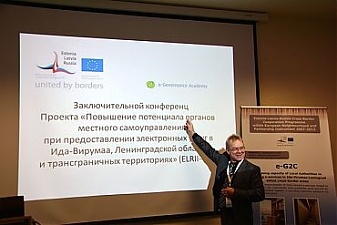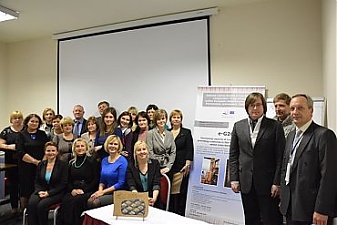Baltic States – CIS, Estonia, Forum, Technology, Transport
International Internet Magazine. Baltic States news & analytics
Monday, 16.02.2026, 14:57
E-services for cross-border municipal archives in Estonia and Russia being created
 Print version
Print version |
|---|
| Arvo Ott, director, e-Riigi Akadeemia Sihtasutus. |
The project aimed at elaboration and pilot implementation of procedures to deliver two socially important municipal services through electronic channels. These services are delivered by the municipal archives, working in the border towns of Narva, Kingisepp, Slantsy, located in the North-East of Estonia and the Leningrad region of the Russian Federation.
There were participants from different institutions at the conference: all seven project partners ( E-governance Academy (the lead partner), "E-signature without Borders" NGO, e-Governance Centre of ITMO University, Narva BAS Foundation, authorities of "Kingisepp region" , "Slantsy region" and Narva city Government), employees of municipal archives from Narva, Kingisepp, Slantsy as well as from other Russian cities´ archives – Gatchina, Vsevolozhsk, Vyborg, Priozersk, also from the Leningrad oblast state Archive. Altogether more than 40 participants took part at the conference.
The project, which started in June 2013, has developed prototypes of two cross-border electronic services for municipal border town archives of Narva, Slantsy and Kingisepp – namely, providing information on burials and records of employment on the other side of the border. Those documents are mostly often claimed by the citizens living on both sides of the border. The process of providing the requested information to the citizens requires a large investment of time and money – the border is either crossed in person by the archivist for document delivery or sent over as registered letter. Prototypes have been tested, approved and recommended for practical implementation and further dissemination.
 |
|---|
Several options for electronic interaction between citizens, authorities and archives were presented and discussed at the conference. These options have become the outputs of the joint collaboration of the international expert group. The project experts have studied in detail the overall state of environment in provision of public and municipal e-services and explored various possibilities of e-documents exchange between the cross-border city archives in terms of technical feasibility. "The main obstacle of cross-border exchange of e-documents lies in the contradictions of the legal framework of the two countries. At the moment, ambiguities in the laws do not provide sufficient basis for mutual recognition of the legitimacy of electronic signatures issued in another country” explained Dmitri Trutnev, the deputy director of the e-Governance Centre of ITMO University. "Nevertheless there are fresh precedents of international exchange of e-documents, for example, between the Russian and Estonian Pension funds. Within the project framework we have developed and described schemes for electronic cross-border interaction, which, in our opinion, do not breach the Russian or Estonian legislation. In order to reach a final decision, we made an inquiry to the competent authorities and are currently waiting for their clarification. Meanwhile, we are preparing a draft agreement between the municipalities and partner archives on e-documents exchange “added Mr. Trutnev.
According to the project participants it is quite possible to establish electronic document exchange between the border cities archives based on "trust" relationship between them and in compliance to the legislation in force. In the framework of this project, all 16 archivists from the three pilot archives were given personalized test ID cards with real certificates for digital use together with ID-card readers, issued by the Estonian Certification Centre (Associate Partner of the project) and Trueb Baltic.
Conference participants also had the opportunity to participate at the international conference "E-government and information society: challenges in Eurasia", which in those days was also held in St. Petersburg.








 «The Baltic Course» Is Sold and Stays in Business!
«The Baltic Course» Is Sold and Stays in Business!

